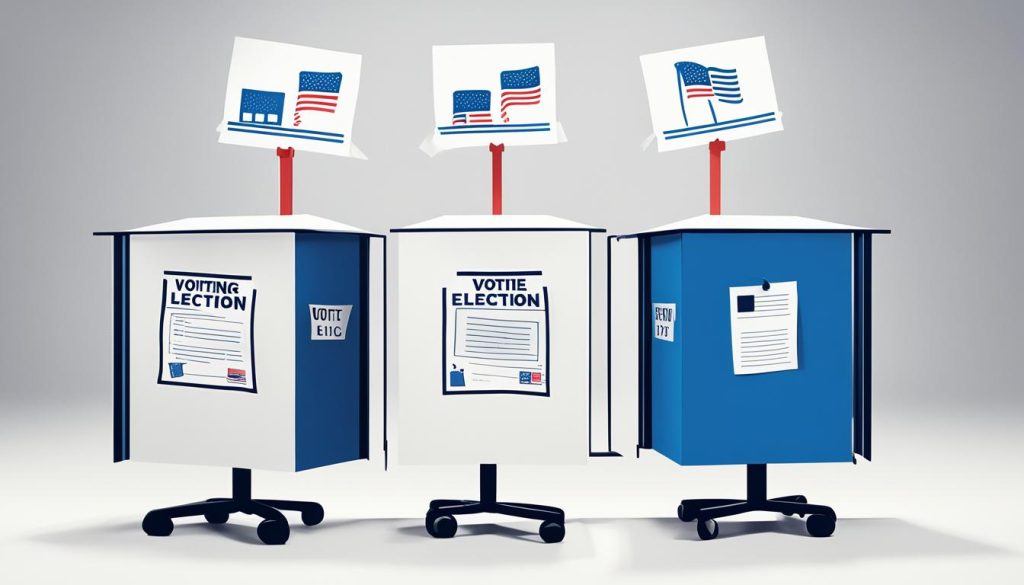The 2024 U.S. presidential election will mark a new era. For the first time, AI tools will let users create fake audio, realistic images, and chat like humans on social media. This raises big worries about AI’s effect on elections. Bad actors might use AI to spread lies, stop people from voting, or get past election security.
AI threats like deepfakes and social media bots are dangerous for democracy and fair elections. Enemies could use these tools to spread false stories, change public opinion, and hurt trust in voting. With these AI tools getting more common, they could harm the core of free and fair elections. This is a big challenge to American democracy’s future.
Key Takeaways
- AI advancements have enabled the creation of deepfakes, synthetic media, and social media bots that can be used to spread disinformation and manipulate elections.
- Malicious actors could leverage these AI-powered tools to suppress voter turnout, target voters with misleading information, and undermine trust in the electoral process.
- The threat of AI-driven disinformation poses a significant challenge to the integrity of elections and the health of American democracy.
- Addressing this threat will require a multi-faceted approach, including legal and regulatory frameworks, ethical AI development, and public awareness initiatives.
- International cooperation will be crucial in combating the global nature of the AI-enabled disinformation threat.
The Rise of AI-Driven Disinformation
In today’s digital world, deepfakes and synthetic media are a big threat to true information. They make fake audio and video that look very real. This can be used to spread lies, pretend to be someone else, or say things that aren’t true. It makes people doubt the information they see and hear.
Also, social media bots are becoming more common. They act like real people and can share information at an incredible speed. These bots can make it seem like many people agree on something or that a story is more popular than it really is. This can lead to people being misled and confused about important topics.
Deepfakes and Synthetic Media
New technology lets us make deepfake and synthetic media that look very real. These can make fake videos, audio, and pictures. They can be used to make it seem like someone said or did something they didn’t. This can cause a lot of confusion and make people question what’s real online.
Social Media Bots and Amplification
Social media bots are now used to spread false information fast. They can quickly share and interact with content, making it seem like many people support or are upset about something. This can change how people see important issues and events, like elections.
This kind of AI use was seen in the 2016 U.S. election and the Brexit vote. It’s still a big problem in elections worldwide.
AI and Election Manipulation Tactics
AI technology has brought new ways to manipulate elections. Sophisticated algorithms can pick and boost content that hits the mark with certain people. This is used to spread misinformation campaigns and AI-driven propaganda, changing what people think and how they vote.
Targeted Misinformation Campaigns
AI bots and language models can make it seem like people agree or believe false election stories. Deepfakes, AI-made audio, and chatbots can also make voting seem risky or spread wrong info about voting. This can lower voter turnout.
Voter Suppression and Misinformation
- AI can spot and target certain groups with voter suppression tactics, like sharing wrong info on voting rules.
- Personalized psychological warfare can try to scare or stop some voters, hurting democracy.
- AI in election manipulation can hurt public trust, weakening our democratic system.
As AI gets better, the risk of it being used for bad things is still a big worry. We need to work on this to keep elections fair and our democracy strong.
The Impact of AI on Public Trust
AI-driven propaganda and disinformation aim to make social and political divisions worse. This makes society more divided and fragmented. It also hurts the ability of governments to meet people’s needs. The erosion of public trust in democratic institutions is a big problem caused by AI in elections. People find it hard to know what’s true and feel their political discussions are being manipulated.
As AI systems get better and more common in politics, the risk of social unrest and losing public trust in democracy increases. People might feel more disconnected from politics, making society even more divided.
It’s important to address how AI affects trust in democracy. We need policymakers, tech companies, and the public to work together. They should make sure AI helps, not hurts, our trust in political systems.
To fight AI-driven fake news and manipulation, we need a strong plan. This plan should include:
- Strengthening media literacy and digital citizenship education to help people make better choices online
- Implementing robust transparency and accountability measures for AI systems used in the political sphere
- Fostering collaboration between government, tech companies, and civil society to tackle AI challenges
By doing these things, we can try to bring back public trust in our democratic institutions. We can make sure AI helps, not harms, our democracy.
AI and the Administration of Elections
Election administration is now more dependent on technology. Artificial intelligence (AI) plays a big part in this. It helps with keeping voter registration databases and aiding voter education in the United States.
Algorithmic Bias in Voter Registration
Many election offices use algorithms to manage voter registration and check mail ballot signatures. These automated systems can make things easier, but they might also have algorithmic bias. This means AI systems could show racial or other biases, leading to unfair voter registration outcomes.
AI-Assisted Voter Education
Recently, there’s been more interest in using generative AI for voter education. These AI tools can make content that teaches voters about the election, candidates, and important issues. But, AI could also spread wrong or biased info, hurting election security.
As AI becomes more important in election administration, we must watch out for problems. Election officials, policymakers, and the public need to make sure AI doesn’t harm fairness, transparency, or democracy.

The Evolution of AI Since 2022
AI has changed a lot in recent years, changing how we use technology. Big steps forward have been made in language models and creating images and audio with AI.
Advancements in Language Models
ChatGPT, a big language model from OpenAI, has started a new chapter in AI. It can talk like a human, answer questions, and help with writing and coding. This shows how powerful AI language models are and has made more people interested and invested in this area.
AI Image and Audio Generation
AI image generation has also made big leaps. Now, you can make very realistic images just by typing what you want, called text-to-image generation. This has changed how we make visual content, making it easier for more people.
AI audio generation has also seen big improvements. Being able to copy someone’s voice with just a little data has led to deepfake audio. This can make fake audio that sounds like real people. But, it also raises worries about misuse and spreading false information.
These AI changes have brought us into a new era of making content and interacting with technology. As AI keeps getting better, we need to think about the ethical and social sides of these AI capabilities. It’s important for leaders, policymakers, and everyone to understand the impact of these changes.
AI: A Unique Vulnerability for Election Disinformation
Elections face a big risk from AI-driven election disinformation. This is because AI tools use a lot of past election disinformation in their training. They pick up on false narratives about voting security and mail voting. They also learn from deceptive content about small glitches that quickly get fixed.
The same false narratives keep showing up in U.S. elections. This makes it easy for AI to create deceptive content that looks real. Plus, AI is getting better at making language, images, and sounds fast. This makes the risk of AI vulnerability in elections even higher.
Bad actors can use AI to make realistic fake narratives and deceptive content. This can change what people think and hurt trust in elections. It’s a big danger to democracy, as people might believe these AI-generated false narratives.
To fight this, we need to make people more aware and better at spotting fake news. We also need strong laws and rules to deal with AI vulnerability in elections. Working together is key. We need policymakers, tech companies, and election officials to protect our democracy from AI-driven election disinformation.
The AI Threat to Election Integrity
Artificial intelligence (AI) is growing fast and threatens the integrity of U.S. elections. State-aligned groups and threats to election systems are big concerns. They worry about how AI affects our democratic process.
State-Aligned Influence Campaigns
In the past, groups linked to states in countries like Russia used big teams and lots of money to try to change election results. Now, with AI, they could do this cheaper and with fewer people. AI can make fake news blend in better with what people already believe and target many voters at once.
Threats to Election Systems
AI can also make phishing attacks more personal and convincing. These attacks could go after election systems. This could make the voting process less secure and hurt trust in the results.
The election integrity, state-aligned influence campaigns, and election systems face risks from AI and misinformation. As AI gets better, we must keep a close watch to protect our democracy.
Combating the AI Threat to Democracy
Stopping AI from messing with elections needs a strong plan. This plan should involve governments, tech companies, and civil groups. It should focus on making laws, making AI ethical, teaching people, and working together across borders.
Legal and Regulatory Frameworks
Governments must create strong laws to fight AI election interference. They should make laws that require AI systems to be open, hold tech companies responsible, and punish those who use AI to mess with elections.
Ethical AI Development
The tech industry should focus on making AI ethical. This means adding safety features, testing AI systems well, and making sure AI tools respect democratic values. Ethical AI development can lessen the risks of AI spreading false information.
Public Awareness and Media Literacy
Teaching people how to spot AI-made content is key in fighting the AI threat. By educating citizens, we can help them spot and report AI-generated content. This makes them better at dealing with digital information and less likely to fall for AI-driven misinformation.
International Cooperation
Stopping AI from harming democracy needs global action. International cooperation is key for sharing info, setting standards, and helping each other protect democratic elections. Governments, tech firms, and civil groups must work together to tackle this issue and keep elections safe.

A detailed plan that includes laws, ethical AI, teaching people, and global teamwork can beat the AI threat. This way, we can keep elections fair and protect democracy.
Conclusion
AI technology is a big threat to democracy. It can change election results and hurt public trust. We must act fast to protect our voting systems and democratic values.
We need to make laws stronger, develop AI ethically, teach people more, and work together with other countries. This will help fight AI-driven lies and interference. By joining forces, we can make sure technology helps our free societies, not harms them.
The future of democracy is uncertain, but we can make a difference now. Let’s face the AI challenge together. We can make sure AI helps everyone, not just a few. The situation is critical, but if we stand united, we can beat the AI threat. We can keep our elections safe for the future.
Source Links
- https://www.brennancenter.org/our-work/analysis-opinion/how-ai-puts-elections-risk-and-needed-safeguards
- https://campaignlegal.org/update/how-artificial-intelligence-influences-elections-and-what-we-can-do-about-it
- https://www.forbes.com/sites/neilsahota/2024/02/02/ai-and-the-shadow-over-democracy-the-rising-threat-to-global-elections/